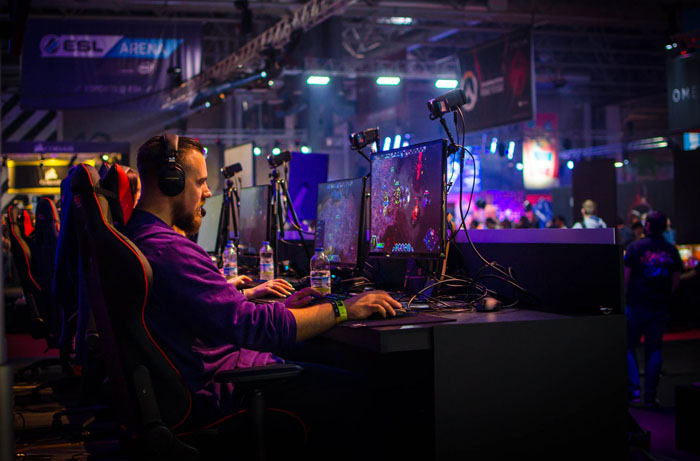Call of Duty (CoD) has firmly established itself as a staple in the eSports world, captivating audiences with its fast-paced gameplay and strategic depth. As a first-person shooter (FPS) game, CoD stands out in the competitive gaming arena with its unique blend of tactical combat and rapid action. While other popular eSports like League of Legends and Dota 2 are celebrated for their strategic, team-based mechanics, CoD offers a more visceral and direct form of competition that appeals to a broad audience of both players and spectators.
 Call of Duty eSports Competitions
Call of Duty eSports CompetitionsThe Evolution of Call of Duty: A Brief History
The Call of Duty series, developed by Activision, debuted in 2003 and quickly became one of the most iconic franchises in gaming history. Over the years, the series has evolved through various iterations, each bringing new features and gameplay mechanics that keep it fresh and engaging. Notable titles in the franchise include:
- Call of Duty 4: Modern Warfare (2007): This game marked a significant shift from World War II settings to modern-day combat, setting a new standard for the FPS genre with its immersive single-player campaign and innovative multiplayer modes.
- Call of Duty: Black Ops (2010): Introduced a Cold War storyline with complex characters and a compelling narrative, along with the popular Zombies mode, which added a cooperative aspect to the game.
- Call of Duty: Warzone (2020): A free-to-play battle royale game that has become a major player in the eSports scene, offering large-scale, highly competitive matches.
Each version of CoD has brought something unique to the table, but they all share a common core of fast-paced, tactical gameplay that demands quick reflexes, precise aim, and strategic thinking.
The Structure of CoD eSports Competitions
Call of Duty eSports competitions are structured around various game modes that test different aspects of players' skills. The primary game modes featured in competitive CoD include:
- Search and Destroy: Teams take turns defending or attacking bomb sites, with no respawns, making every move critical and encouraging strategic planning.
- Hardpoint: Teams compete to control rotating points on the map, requiring both offensive and defensive tactics to maintain control and accumulate points.
- Control: Combines elements of Search and Destroy and Hardpoint, with teams capturing and defending objectives in a more structured manner.
Competitions are typically held in a tournament format, ranging from small local events to major international championships. The Call of Duty League (CDL), established by Activision, is the premier competitive league for the game, featuring franchised teams from around the world. The CDL hosts a regular season of matches followed by playoffs and a championship event, where teams compete for substantial prize money and the title of world champion.
What is Involved in CoD eSports Competitions?
Participating in a Call of Duty eSports competition involves a high level of preparation, teamwork, and strategic planning. Here’s a breakdown of what is involved:
- Team Composition and Roles: A typical competitive CoD team consists of five players, each with specific roles such as objective player, support, and slayer. Teams must work together to coordinate strategies, communicate effectively, and adapt to the evolving dynamics of each match.
- Map Knowledge and Strategy: Success in CoD competitions requires an intimate knowledge of the game maps, including key locations, sightlines, and chokepoints. Teams develop and practice detailed strategies for each map and game mode, including pre-planned plays and reactive tactics.
- Loadouts and Customization: Players customize their loadouts with specific weapons, attachments, and perks tailored to their play style and the needs of the team. This customization allows for a high degree of tactical flexibility and personal preference.
- Practice and Scrimmages: Professional CoD teams spend countless hours practicing their skills and strategies, often scrimmaging against other teams to refine their gameplay and develop new tactics. This practice is essential for maintaining peak performance and staying competitive in the ever-evolving meta of the game.
- Communication and Coordination: Effective communication is crucial in CoD competitions. Teams use in-game and external voice communication tools to relay information about enemy positions, objectives, and strategy adjustments. Coordination and quick decision-making can make the difference between victory and defeat.
- Analysis and Adaptation: Teams analyze their own gameplay and that of their opponents to identify strengths, weaknesses, and opportunities for improvement. This analysis is key to developing counter-strategies and staying ahead of the competition.
Conclusion: The Future of CoD in eSports
The future of Call of Duty in eSports looks bright, with ongoing support from a growing global fanbase. The game's dynamic gameplay, combined with its evolving eSports infrastructure, ensures that CoD will continue to be a major force in competitive gaming. As new titles and updates are released, and as the eSports scene continues to expand, Call of Duty is poised to remain a cornerstone of the eSports world, offering thrilling competition and opportunities for players and fans alike.
CoD Articles
- Call of Duty MW3: MW3 Cheats Can Improve Strategic Thinking and Reaction Time
- Call of Duty MW: Tips for Dominating Close-Range Combat
- Call of Duty MW3: Why Pro Gamers Use Hacks in CoD MW3: An Insider's Look
Related Pages
- List of eSports
- List of eSport Tournaments
- esports at the Olympic Games — will the sport make it to the international pinnacle of sports?
- Do you think esports should be added to the Olympic Games program [poll]
- Should eSports Games Be Realistic? not everyone wants it that way.
- All About esports


 Upcoming Events
Upcoming Events